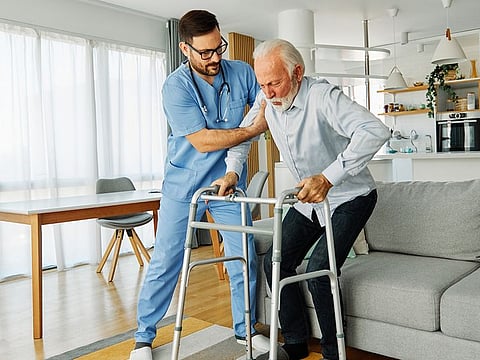Let care begin at home
The healthcare-at-home model has grown in popularity

Highlight
The healthcare-at-home model has grown in popularity enabling organisations to provide acute-level care in patient homes and expanding needed access to care
Providing clinic- or hospital-level care at home is not a new concept, but the popularity of such programmes grew during the Covid-19 pandemic. As cases of the deadly coronavirus began surging in March 2020, healthcare organisations stopped various types of in-person care due to capacity constraints and fears of exposing people to the virus. As they turned to virtual care strategies to manage patients, healthcare-at-home programmes emerged as a key tool.
Today, healthcare organisations are continuing to rely on healthcare-at-home programmes even though in-person care has largely resumed. This is mainly due to the benefits afforded to patients by the home care model and its potential to help rein in costs.
The healthcare-at-home model enables the delivery of acute-level care in patients’ homes. Thumbay Physical Therapy and Rehabilitation Hospital offers a broad range of specialised therapies to meet diverse needs, such as comprehensive physiotherapy assessment and treatment for musculoskeletal and neurological disorder in adults, adolescents and the elderly and paediatric rehabilitation. “Our skilled physiotherapists focus on improving mobility, relieving pain, and restoring function,” explains Dr Sharmila Banu, Incharge and Chair of the Department, Thumbay Physical Therapy and Rehabilitation Hospital. “We also offer speech therapy assessments and targeted treatments for communication disorders, including articulation, language, fluency and social skills.”
The hospital’s occupational therapists specialise in assessing and treating adults with autism, focusing on daily living skills, sensory integration, social interaction, and vocational training.
Salamati Home Care, one of the premium home healthcare service providers in the UAE, provides a wide range of healthcare services in the comfort of your home, hotel, office, and even gym. “It includes 24/7 nursing services, doctor on call, physiotherapy, cupping, needling, speech therapy, blood test, food intolerance test, robotic rehabilitation post stroke, IV drips, wellness at home, medical equipment at home, and caregivers and maid training programme,” says Cendrella El Chamy, Chief Nursing Officer, Salamati Home Care.

Use of technology
Supported by new technology that can access data from any location, healthcare organisations are using remote patient monitoring strategies to bring care into homes.
As a rehabilitation hospital equipped with state-of-the-art facilities and advanced technology, Thumbay Physical Therapy and Rehabilitation Hospital is looking to add a digital platform that connects patients, doctors, nurses and its back-office team. “By developing mobile applications for patients and a web application for the team, we aim to streamline communication and provide convenient access to medical records, appointment scheduling, and personalised care plans,” says Dr Banu. “Additionally, we’re exploring remote monitoring technologies to ensure continuous monitoring of patients’ progress from their homes. We are excited about the potential of these technologies to revolutionise rehabilitation care and provide a seamless experience for everyone involved.”
Salamati Home Care has introduced technologies that can improve communication, remote monitoring, medication management, and overall efficiency. It uses telehealth technologies to provide virtual consultations, remote monitoring, and video conferencing between patients and healthcare providers. “Salamati is the only home healthcare provider in Dubai that utilises soft robotic gloves for stroke rehabilitation,” says El Chamy. “Soft robotic gloves are crucial for individuals with hand impairments, offering restored hand function, increased independence, and improved quality of life.”
Salamati is also the first home healthcare provider in the UAE to utilise virtual reality to manage psychological issues at home. This technology offers immersive experiences that can alleviate anxiety, promote relaxation, and facilitate therapeutic interventions.

Tackling challenges
There are tremendous opportunities to improve care through these home-based care models, but there are also significant risks and challenges to their broader adoption.
“We have implemented a comprehensive strategy that prioritises compliance, quality, and reputation to overcome any hurdles in offering the best healthcare to our patients,” says El Chamy. “We have developed robust policies and procedures that align with the regulations set by the Dubai Health Authority and the Ministry of Labour.”
Besides, the company meticulously selects qualified professionals who possess the skills and experience to provide exceptional care. It has implemented a comprehensive onboarding training programme recognised as one of the best in Dubai to follow standardised protocols, conduct regular audits, and actively seek and address feedback to continually enhance quality control measures. “We place great emphasis on patient satisfaction and maintain open and transparent communication with our clients,” says El Chamy. “By addressing their concerns promptly and effectively, we strive to build and maintain a positive reputation.”
One of the challenges home care services in rehabilitation often face is limited access to specialised equipment and facilities that are made available to them in a hospital. However, Thumbay Physical Therapy and Rehabilitation Hospital has overcome this challenge by providing patients with alternative versions that can be easily used at home. “In addition, we also arrange regular home visits by physiotherapists, occupational therapists, and speech therapists to assess the patient’s progress, provide hands-on treatment, and offer guidance on home exercises and activities,” says Dr Banu. “Not only does this help in providing remote consultations and monitoring, but also assists patients in connecting better with healthcare professionals through video calls, receive their guidance on exercises, and track their progress.”


